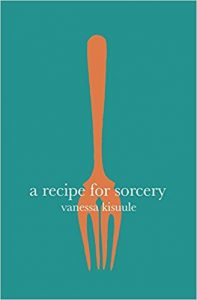A Recipe for Sorcery
 Writer, performer and burlesque artist Vanessa Kisuule is also a winner of over ten slam titles. She has performed at various poetry events and venues and has published two poetry collections – Joyriding the Storm (2014) and A Recipe for a Sorcery (2017). The latter, her most recent collection, uncovers the magical in the ordinary and explores what it means to be a woman.
Writer, performer and burlesque artist Vanessa Kisuule is also a winner of over ten slam titles. She has performed at various poetry events and venues and has published two poetry collections – Joyriding the Storm (2014) and A Recipe for a Sorcery (2017). The latter, her most recent collection, uncovers the magical in the ordinary and explores what it means to be a woman.
Kisuule’s poetry is an open invitation to celebrate life, language and women. Described as a recipe book with a twist, a “cathartic” howl, an “unspooling” of resentment and truths, overheard conversations – an “instruction manual”, her poetry is a loud and ambitious scream to women everywhere, though it doesn’t exclude other genders. What is so astonishing about the collection is just how many poems transmit a positive and obvious feminist force; I laughed and cried realising the poems are about me and every woman I know.
The first poem in the collection, “A note on this book’’, warns the reader about ugly and uncomfortable truths that will follow. Beneath short stanzas and lyricism is a flow of concealed fears and indignation:
i often dream of sorceress women
illuminated by restless firelight
all wearing different versions of my face [.]
Kisuule’s disarming honesty and sense of humour make the collection particularly readable. After a warning note, the poet divides her poems into small sections/recipes for sustenance, retaliation, retreat, absorption and release:
first it simmers
then it boils
and then it
spills over [.]
Every recipe is followed by stanzas of various lengths and sounds, speaking to us in a direct and sincere tone. Poems such as “Take up space’’ lift us from obscurity and make us question the things we take to be ordinary:
always the one
laughing at the jokes
you can make them too
not just about sex, diets and tampons
you are not the wingtip tick on a quota list [.]
Kisuule presents womanhood in a rather edgy and rebellious way: lines encode eating disorders, clumsiness, self-esteem and sexuality while redefining what is magical and conceivable. I hope that these poems allow women an opportunity to recognize themselves and step out of a brutalising misogyny.
One poem, “Cornrows’’, touches on a personal story of Kisuule. It is a young girl’s journey towards self-love which links generations of women:
hunched between my mother’s knees
on sunday evenings
a wire forest of hair
submits to salt of stoic tear [.]
The combination of little fragments and short lines creates an impression of a mind flowing that transforms into a story-telling; the story is based on a child’s memories, but told from the grown up’s perspective:
sometimes i want to run
back to the top of the stairs
settle myself back between her knees
where despite the searing pain
i felt safe and soft [.]
The recipes and reminders to other women are playful and observant. “A recipe for release’’ gives a vibrant and long list of ingredients without revealing the method; only one line followed by blank pages, revealing a crucial message – release is time. Perhaps this is too obvious, too basic. Yet, I have never found simplicity so delightful.
One poem that resonates with me is “How to raise a man’’. Courageous and unexpected lines left me nodding and disagreeing at the same time: ‘he’s not granted permission/ to cave in on himself/ so be his cave’. The note accompanying this book was right: these words may not always go down so easy. By the time I reached the end of the collection, I found myself genuinely inspired by Kisuule’s take on life. Burning and powerful, A Recipe for a Sorcery will change minds and leave scars; her sorcery lies in being unafraid to be real. I will now share these poems as my favourite recipes – generation to generation.

Leave a Reply